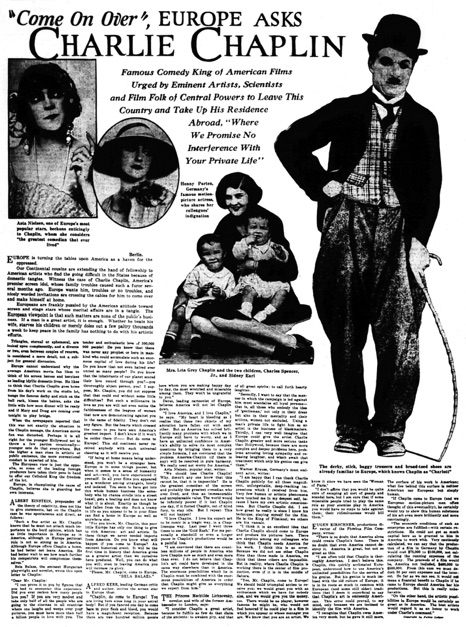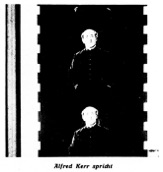The Circus 1927 1928 1929 next previous
The Circus Clippings 137/376
South Bend Tribune, South Bend, Indiana, April 24, 1927.
Alfred Kerr spricht
(...) Photo, Illustrierte Film-Zeitung, Berliner Tageblatt,
March 17, 1927
„Chaplin, do come to Europe!“
Editorial content. „,Come On Over‘, EUROPE ASKS
CHARLIE CHAPLIN
Famous Comedy King of American Films Urged by Eminent
Artists, Scientists and Film Folk of Central Powers
to Leave This Country and Take Up His Residence Abroad,
,Where We Promise No Interference With Your
Private Life‘
Photo. „Asta Nielsen, one of Europe‘s most popular
stars, beckons enticingly to Chaplin, whom she considers
,the greatest comedian that ever lived‘“
Photo. „Henny Porten, Germany‘s famous motion-picture
actress, who shares her colleagues‘ indignation“
Photo. „Mrs. Lita Grey Chaplin and the two children,
Charles Spencer, Jr., and Sidney Earl“
Photo. „The derby, stick, baggy trousers and broad-toed
shoes are already familiar to Europe, which knows Chaplin
as ,Charlott‘“
Berlin.
EUROPE is turning the tables upon America as a haven
for the oppressed.
Our Continental cousins are extending the hand of fellowship
to American artists who find the going difficult in the States
because of domestic tangles. Witness the case of Charlie Chaplin,
America‘s premier screen idol, whose family troubles
caused such a furor several months ago. Europe wants him,
troubles or no troubles, and nicely worded invitations
are crossing the cables for him to come over and make
himself at home.“ (...)
„ALBERT EINSTEIN, propounder of the theory
of relativity, does not like to give statements, but on the Chaplin
case he was spontaneous and direct, as follows:
,Such a fine artist as Mr. Chaplin knows that he must
not attach much importance to the herd opinion,
which has so little importance in Europe as in America,
although in Europe petticoat rule is not so strong
as in America. Although Europe offers Chaplin a home, he had
better not leave America. He had better wait to see
how much further his compatriots will compromise themselves.‘
Bela Balazs, the eminent Hungarian playwright and
novelist, wrote this open letter to Chaplin:
,Dear Mr. Chaplin:
,I can prove it to you by figures that you had to encounter
this experience. Did you ever reckon how many people
love you? If you are very modest and take only half of all people
who are going to the cinemas in all countries where
one laughs and weeps over your pictures, you must have more
than half a billion people in love with you. The tender
and enthusiastic love of 500,000,000 people! Do you know
that there was never any prophet or hero in mankind
who could accumulate such an enormous capital of love
during his life? Do you know that not even hatred
ever united so many people? Do you know that the inhabitants
of our planet scored their love record through you? –
you thoroughly abject person, you! I suppose, Mr. Chaplin,
you did not suppose that that could end without
some little difficulties? But such a millionaire in love as you are
will not even notice the faithlessness of the leagues
of women that now are demonstrating against you in the name
of fidelity. They don‘t cut any figure. But the hearts
which crossed the ocean to you have seen America‘s greatest
import. I don‘t know if it won‘t be colder there if – But
do come to Europe! This old continent never received anybody
with such universal cheering as it will receive you.
,If being at home means being understood, you won‘t
be a stranger here. Europe is in some things poorer,
but when it comes to a sense of humanity and art – well, you
have experienced it yourself. In all your films you
appeared as a wonderer among strangers, lonely and isolated.
You seem to have got into this whole human business
like somebody who by chance strolls into a street brawl, gets
a beating and does not know what it is about. Exactly
as though he had fallen from the sky. Such a tramp in life
as you appear to be in your films can find a home
in Europe as well as anywhere else.
,For you know, Mr. Chaplin, this poor little Europe has only
one thing to give to rich America: art and artists. In these
things we never needed imports from America. Do you know
what will happen if you come to Europe? An eminent
historical event. It will be the first time in history that America
gives us a greater artist that we ourselves have
produced. Well, you can do what you will; even in leaving
America you will increase its glory.
,Please, Mr. Chaplin, come to Europe.
,BELA BALAZS.‘
ALFRED KERR, leading German critic and author, invites
the screen star to Europe thus:
,Chaplin, do come to Europe! You are living here since
long in your astral body! But if you fancied one day
to come here in your flesh and blood, you would have
a magnificent reception. Because there are two
hundred million people here whom you are making happy
day by day, the most wretched and miserable among
them. They won‘t be ungrateful to you.“ (...)
„Asta Nielsen, popular star, writes:
,We should lose Charlie Chaplin! Why, doesn‘t any one
know that this cannot be, that it is impossible? He is
the greatest comedian of the screen and probably the greatest
comedian who ever lived, and thus an immeasurable
and unreplaceable value. The world would be infinitely poorer
if it lost Chaplin one day, if it forced Chaplin, out of blind
fury, to stay idle. But I repeat: This will not happen!
,I love Chaplin. I love his superb art to be comic in a tragic
way, in a Chaplinesque way. Last year I went three
times to see the Gold Rush. For me personally a standstill
or even a longer pause in Chaplin‘s productions
would be a painful loss.
,I am convinced that there are countless millions of people
in America who love Chaplin now as much and even
more than ever. I do not believe that Chaplin‘s art could have
developed in the same way elsewhere than in America.
The enormous possibilities which lie in Chaplin must be combined
with the enormous possibilities of America in order
that Chaplin might give us everything we expect from him.‘“ (...)
Also in Salt Lake Telegram, April 24, 1927, and
Miami Herald, April 24, 1927.
Redaktioneller Inhalt
The Circus 1927 1928 1929 next previous


